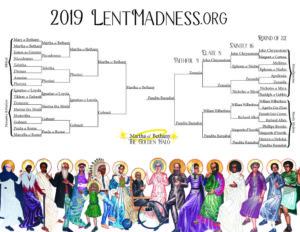 May 12, 2019: May God’s words alone be spoken, may God’s words alone be heard. Amen.
May 12, 2019: May God’s words alone be spoken, may God’s words alone be heard. Amen.
I want to wish all the women here a very Happy Mother’s Day. I, for one, got a nice card from my dog Lexi and my two cats Katie & Lauren, complete with paw prints (their grandma – my mother – helped with the whole thing of course).
But as I note every year, this is also a difficult day, or one that brings about mixed feelings for many – those whose mother’s have died, or those whose mothers are absent – in whatever way that may mean, or those mothers who have lost a child, or those women who could not have one – for them Mother’s Day can be troubling, awkward, or even painful. And if that is you, know that we, your parish family, are holding you in prayer.
And so, as I also say each year, that is that is why I like to think of today as less about Mothers specifically, and more about women – mothers, sisters, daughters, wives, nieces, aunts, and friends. Women who have been a part of our lives – nurturing, mentoring, loving, caring. That is what we really celebrate today – the journey of women – us, if we are women, and those women who have been a part of our lives.
Which is why this passage from the Acts of the Apostles we heard this morning is such a powerful text for us today. It is the story of a disciple of Jesus. No, not Peter, though he is a part of it. This is the story of Tabitha, her name in Hebrew, also known to her community as Dorcas, her name in Greek. Both of which mean Gazelle, or beauty and grace.
Of course, when I think of the name Tabitha, my mind goes right to “Bewitched,” that sitcom from the 60s. Tabitha was the daughter of Samantha, the witch married to a very regular man named Darrin. I thought it would be so cool to be her, or her mom, I mean – when my mom would tell me to clean my room, I wanted to just wiggle my nose and make it all happen like they did. Heck, I want that now, right? I mean, maybe that is why I love Harry Potter so much – I’d love to just wave a wand and all my office paperwork would just fly right into the file drawer, or my house would just tidy itself up.
But that is not the Tabitha we are talking about, and still this Tabitha, the one for whom Peter was summoned, worked magic of her own. It is the kind of magic all of us are capable of doing – no wiggling of noses or wands required. Truth be told, it isn’t really magic at all, though the effect may seem as marvelous to those who witness it. So let’s hear her story.
The first thing we hear about her is in the opening of the text. It says “Now in Joppa there was a disciple whose name was Tabitha, which in Greek is Dorcas. She was devoted to good works and acts of charity.” Let me just repeat this part “there was a disciple whose name was Tabitha.” This is the only time in the bible where a woman is named a disciple, or μαθήτρια(mah-thay-trrree-ah) in the original Greek. Now, we know that Tabitha isn’t the only female disciple. Just a few weeks ago on Easter Sunday we hear about Mary, called Magdalene, right?
In fact, it was this gospel text we heard today that I brought forward that Sunday, because in it Jesus says “my sheep hear my voice,” and Mary recognized Jesus in the garden outside the tomb not by sight, but when he called out to her. She then called him “Teacher” – something only a disciple would do. The author of Acts, where we hear about Tabitha, is also the author who wrote the Gospel of Luke, where we hear that it was women followers of Jesus, otherwise known as disciples, who supported his ministry out of their means.
So, Tabitha wasn’t the only female disciple, but she must have really stood out to not only be named as such, but really – to be named at all! So many women, powerful women, are not named in our bible, or quite frankly, are the hidden figures of our society. This is why when Tabitha was named as one of the saints in Lent Madness, I was rooting for her.
For those who, for reasons I just can’t fathom, do not know what Lent Madness is, it is the Episcopal version of March Madness, only instead of college basketball teams, it is 32 saints of the church who do battle to claim the coveted Golden Halo.
Our girl Tabitha was rockin’ it in the original battle, defeating Dismas, the redemptive criminal crucified with Jesus, in an absolute rout in the first round. But much to my  frustration, she was up against another fab woman saint – Photini – in the Saintly Sixteen round, where she went down in flames. Photini, if you don’t know, is the name given to the unnamed woman at the well in John 4 who has one of the most engaging theological discussions with Jesus ever recorded. Still, I am happy with the ultimate winner of the golden halo, that woman of work and prophetic exclamations, Martha of Bethany. Yup – she won it, leaving her sister Mary in the dust after they were paired against one another in the first round.
frustration, she was up against another fab woman saint – Photini – in the Saintly Sixteen round, where she went down in flames. Photini, if you don’t know, is the name given to the unnamed woman at the well in John 4 who has one of the most engaging theological discussions with Jesus ever recorded. Still, I am happy with the ultimate winner of the golden halo, that woman of work and prophetic exclamations, Martha of Bethany. Yup – she won it, leaving her sister Mary in the dust after they were paired against one another in the first round.
But we are not in Lent anymore, we are in Eastertide, and that is one of the reasons Tabitha’s story is so important for us to hear now. Yes, partly because it is one of death and resurrection. She was dead, and was raised back to life through Peter’s intercession. But it is also about what it means for us when we die, when those we love die, and the new life that springs forward from those experiences. Because we learn all about Tabitha not from her own words, but by those who are deeply grieved by her death.
The widows of town come to bath her body and to mourn her. They send men to find Peter to bring him in when they heard he was in the nearby town. What were they hoping for when they told him to come without delay? Whatever it was, this was Peter’s first pastoral call, and when he arrived, he entered into a room of full of mourners.
I know that feeling. Every priest knows that feeling. I have been the one entering that hospital room, or that bedroom in a home, where someone lay dying, or already dead. Where the family stood, not knowing what to do next as they stood in that shadow of death – hoping beyond hope that the words we heard in the Psalm today were true – “Though I walk through the valley of the shadow of death, I shall fear no evil; for you are with me; your rod and your staff, they comfort me.” I know that place Peter walked into, and oh how I have wished every time that I could dismiss everyone from the room to change what had happened, or was about to happen.
The truth is though that as hard as that is, it is harder to be the ones standing around the room. I have been there too, and so have many of you. We feel the pain of those grieving Tabitha. We understand their wailing. And so perhaps we can honor that by paying attention to them, because they tells us a lot about Tabitha, and a lot about who we are, or are supposed to be.
The story tells us that when Peter arrived the widows were standing there weeping and showing the clothing that she had woven for them, displaying openly her “good works and acts of charity.”
Think about that for a moment, because we seem to have lost the significance of what they were saying in this moment. Today most people are able to find clothing already made and ready to wear. Heck, in our disposable world, they even sell travel clothing meant to be disposed of after wearing it once or twice (a sad commentary on our economic injustice to be sure). Yet, not too long ago, if you didn’t make it, you didn’t have it. Our grandmothers had clothing made for them, and they in turn made them for us. Some people still make clothes for their family. Sadly, this skill seems to be lost on me.
I did once want to learn how to knit, and while visiting my grandma in Beckley, West Virginia, she tried to teach me – God bless her, really. While I seemed to get the knack for it while I was there, I had an issue when I got back home. I was trying to make a scarf and it kept getting wider and wider. I called my grandma, and she said “Now Diana, you’ve got to count!” Now that was just too much work to have to concentrate on math AND on the stitching. I am hopeless in the making clothes department.
 Apparently this sort of thing isn’t genetic, as my grandma had made many outfits for me when I was little. I remember shopping for patterns with her at the local Piece Goods shop in Beckley. I was never really all that happy about it, because she wanted to make nice little dresses for me, and I wanted a baseball uniform or a cowboy outfit. But these are now good memories for me. What I didn’t realize until I was older was that this wasn’t just for fun – this is what families did to get by.
Apparently this sort of thing isn’t genetic, as my grandma had made many outfits for me when I was little. I remember shopping for patterns with her at the local Piece Goods shop in Beckley. I was never really all that happy about it, because she wanted to make nice little dresses for me, and I wanted a baseball uniform or a cowboy outfit. But these are now good memories for me. What I didn’t realize until I was older was that this wasn’t just for fun – this is what families did to get by.
I remember my dad telling me that when he was young and working in my grandfather’s grocery store, the women in town would come in and go to the back  where bags of feed were sold to farmers for the livestock. They would look them over carefully, trying to see if there were any with nice patterns on the bag. If they found one they liked, they would have the lads in the store, my dad included, unpack these heavy feed bags, which were stacked from floor to ceiling, until they could get the lady the bag she wanted – my dad lamenting that it never seemed to be the top bag they needed. Why all the fuss over a particular bag of feed? They made clothing out of the material from the bag, and later, my dad told me, he would see people wearing skirts or shirts made from those bags around town, which were passed down among family members until they were worn beyond hope.
where bags of feed were sold to farmers for the livestock. They would look them over carefully, trying to see if there were any with nice patterns on the bag. If they found one they liked, they would have the lads in the store, my dad included, unpack these heavy feed bags, which were stacked from floor to ceiling, until they could get the lady the bag she wanted – my dad lamenting that it never seemed to be the top bag they needed. Why all the fuss over a particular bag of feed? They made clothing out of the material from the bag, and later, my dad told me, he would see people wearing skirts or shirts made from those bags around town, which were passed down among family members until they were worn beyond hope.
All of this to say that the making of clothing is not only an art, but until recently (and still true in many parts of our country and the world) provided the only clothing one might have for oneself or family members. For widows in the time of Tabitha, articles of clothing would be more valuable than gold – for they were without means of support. That is why Jesus calls us to care for the widows and the orphans, for they were, and are, the least of these in which we are to see the face of Jesus. Tabitha saw them. Tabitha took care of them out of her means, and by her own hand. She was a true disciple of Christ. And when she died, they were in despair for the loss of one who loved them, as he loved us.
The question for all of us today is – when we die, who will be standing in that room, and what will they be showing to others of how we impacted their lives? What will they miss most about us? What are we sewing in the hearts of others? How do they know us as disciples of Jesus Christ? Who will weep for us?
And for our church, the same can be asked. In fact, our Bishop asked this very question of us in her visit, right? If we were to close our doors – who in the community would miss us? Whom do we serve? Who calls this place a safe or welcoming home for them to gather? How does our community know us as disciples of Christ other than by the name of our church?
Of course we know the answer to the question about the church, because we know the ministry we do here, and the people who call this place home – the NJ Reading Orchestra, PFLAG – (Parents & Friends of Lesbians & Gays), the Bolshoi Music Studio, the Cub Scout Pine Wood Derby, the local animal shelters, the local food pantry, the children and parents of our nursery school, and so many more.
But again, what about us?
Tabitha reminds us of who we should aspire to be – a faithful disciple of Jesus, and yet we know that living our life in Christ doesn’t have to involve talent or means. It just requires that we look beyond our own needs to those of others.
As my dad was telling me about the feed bags, it reminded him of another moment in his life. It was when we had moved to Maryland from Long Island, and my parents were struggling to make ends meet – my mom trying to stretch five dollars into a week of food for a family of four. My dad had returned to Long Island where they were trying to get our former house sold. As he was leaving, my mom gave him a bag of clothing filled with things I could no longer fit into. Dad took them to our former Pastor’s house. When his wife saw the clothing she wept. They had three daughters younger than me, and they apparently were in need themselves (I guarantee you the dresses were in great shape too for having hardly been worn).
So you see, our lives in Christ, our being Tabitha the faithful disciple in the world, doesn’t necessarily involve super human acts of piety or prophetic witness, though it could. It doesn’t even require the talent of making clothes. The truth is that it likely comes in more simple ways – like remembering that the clothes we no longer wear may bring tears to the eyes of someone for whom those garments are only a pipe dream. It means caring for others, the ones whom Jesus called us to see, and in doing this, it is our own life we are saving.
I am reminded of a story by Bea Salazar in Fast Company, a magazine I used to read a lot when I was in business. She wrote “In 1990, I had undergone back surgery and was on disability. I was depressed and just trying to get through each day.
One afternoon, when I was putting out the trash, I saw a little boy digging in a dumpster for food. I took him inside, made him a peanut-butter-and-jelly sandwich, and sent him home. Fifteen minutes later, there was a knock at my door, and I opened it to find six more kids standing there. “Is it true that you’re giving away peanut-butter-and-jelly sandwiches?” one of them asked.
I couldn’t believe that there was no one caring for these kids. It was summer, and school was out. They told me that their parents had to work. The next day, more children showed up, and more arrived the day after that. When school began again, kids came and asked for help with homework. Volunteers and supplies from local churches and schools poured in. My landlord donated an apartment, and soon I had 100 children coming to visit each day. Ten years later, five of the kids have begun community college. I never thought that making one peanut-butter-and-jelly sandwich would grow into something that would affect so many lives – especially mine. Those kids pulled me out of myself. There was a point when I stopped thinking about my own pain and started concentrating on somebody else’s. It’s true that when you help others, you help yourself.”[1]
On this Mother’s Day, as we remember the good works of Tabitha, the disciple of Jesus, let us consider the women in our lives who have exemplified discipleship to us, and give thanks for them. And let us also model them, the Tabithas of our lives, by being the living members of the body of Christ, caring for the widows and orphans today – the lonely, the lost, the least, and the last. For what may seem as small as a PB&J sandwich may just be the very thing which saves countless other lives, including our own.
We are all Tabitha, for we are faithful disciples, who died and rose again in Christ – in our baptism. May our final days leave behind such a legacy of good works and charity, of faithfulness in prayer, of loving and serving in his name, that those gathered weep for our having touched their lives with grace, while heaven rejoices saying “well done, good and faithful servant of the Lord.”
Amen.
For the audio from the 10:30am service, click below, or subscribe to our iTunes Sermon Podcast by clicking here:
[1]Bea Salazar, “Is it true that you’re giving away peanut-butter-and-jelly sandwiches?” Fast Company, December 2000, 108.
The Rev. Diana L. Wilcox
Christ Church in Bloomfield & Glen Ridge
May 12, 2019
Easter 4 – Year C
1st Reading – Acts 9:36-43
Psalm 23
2nd Reading – Revelation 7:9-17
Gospel – John 10:22-30






